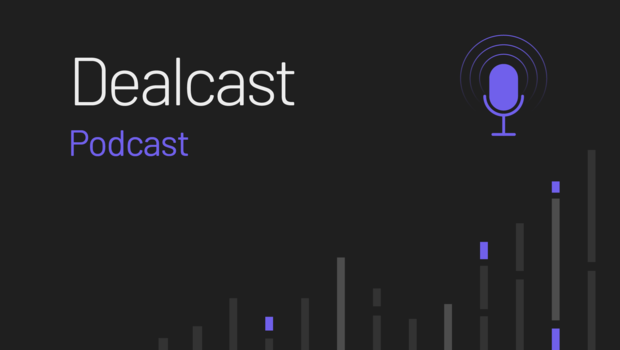Why It’s an Exciting Time for TMT in EMEA
16 September 2022
In this week’s episode, we’re looking at the rise in TMT dealmaking activity across Europe. To learn more, we’re joined by Charlie Taylor-Kroll, head of TMT M&A EMEA at Mergermarket. Dealcast is presented by Mergermarket and SS&C Intralinks.
In this episode, you’ll learn about:
- The array of recent take-privates, including Darktrace, Aviva and Microfocus
- What’s driving the spur in activity in Tech and Telecom
- The outlook for M&A in the Software sector
- Hot subsectors to look for
- Why private equity will be dominant in the space despite macro headwinds
Dealmakers, sign up for our monthly INsights newsletter here.
Transcript
[MUSIC PLAYING] JULIE-ANNA NEEDHAM: Welcome to Dealcast, the weekly M&A podcast presented to you by Mergermarket and SS&C Intralinks. I'm Julie-Anna Needham, a business journalist who's been covering M&A for a decade. In this episode, we're looking at TMT activity across Europe. I'm joined by Charlie Taylor-Kroll, head of TMT for Europe for merge markets.
Hi, Charlie. Thanks very much for joining me.
CHARLIE TAYLOR-KROLL: Thank you very much for having me.
JULIE-ANNA NEEDHAM: So let's start with some of the UK-listed TMT companies. We've seen lots of activity across Europe, including some major deals announced for UK-listed companies. Can you run through some of those? Micro Focus, Darktrace, and Aviva.
CHARLIE TAYLOR-KROLL: Yes, of course. So for a traditionally quiet period in the year, August was very exciting for TMT. And as you just said, we saw a lot of deals coming through. And those three in particular really making the headlines. Micro Focus, especially a UK-listed IT services firm, has agreed on a deal with a Canadian peer, OpenText.
Another case of the attractiveness of U.K. assets is when there's a point at which valuation is depressed, but also there's underlying strength in the businesses. So this is one that has been announced at a fairly healthy premium. It looks like general positivity should come through. Likewise, another U.K. situation Aviva, essentially the remaining stake of Aviva, has been acquired by Schneider Electric, which has already owned a shareholding in the company, and they've agreed to acquire the rest of it.
And again, this is very much in line with looking at how UK-listed firms have traded over the last 12 months and basically seeing it as better value. Now the final one, which we have seen, which is an interesting case and certainly more up in the air, is Darktrace, the cybersecurity firm which was listed not so long ago. In August, it was announced that Thoma Bravo was exploring a potential takeover of it. We now know they've decided against it.
But I think what's interesting with this case is it seems that there are several other bidders both in terms of U.S. strategics, U.S. private equity and European private equity that are still exploring the option. And this is one we'll keep an eye on. As we know, cybersecurity in the internet world has become a very, very hot asset and people are very, very interested in acquiring these businesses. So with Thomas Bravo now out of the picture, it'll be interesting to see who might come out of the woodwork and look at this.
JULIE-ANNA NEEDHAM: Thanks, Charlie. So the connection between two of those companies, Micro Focus and Darktrace, is Mike Lynch, who is the founder, of course, of Darktrace who's also been in the news for different reasons but is a kind of interesting entrepreneur nonetheless who's currently fighting extradition to the US in relation to a previous deal for the company he was working or the previous company he set up.
With the take private approaches of Darktrace and Aviva, does this mean that more buyouts are on the horizon more broadly? And if so, what's driving that trend?
CHARLIE TAYLOR-KROLL: Absolutely. Take privates is something which people are very much expecting for that to continue and even increase in the second and in third and fourth quarter of this year. The depression of tech stocks globally has meant that companies that are otherwise looked to be overvalued are now trading at a discount. And coupled with the continuing dry powder you see amongst private equity firms who are looking to deploy despite the macro environment, that still seems to very much be the case for funds.
So we do expect that, especially in the tech space where you have companies such as Darktrace, which have very strong underlying fundamentals. But that gives the private equity an opportunity to get a deal done. I suppose the big caveat at the moment on these large-cap deals is to do with the financing markets. And I think what's interesting is to see how that might play out.
Obviously, at the moment, you've seen a trio of rising interest rates, surging inflation, and also kind of recession fears that have created these unprecedented conditions for deal makers, which means that it's harder potentially to secure financing for these deals. I think it remains to be seen how that may play out for the rest of the year and ultimately will have a knock-on effect of the plausibility of these bigger buyouts going forward.
JULIE-ANNA NEEDHAM: Thank you. And turning our attention to another part of the TMT sector, telecom and telecom towers. We've seen telecom deal makers preoccupied with the 18 billion euro sale of Deutsche Telekom's tower portfolio. After this very competitive auction process, what do you think will be next for European tower consolidation and M&A activity?
CHARLIE TAYLOR-KROLL: I think this is a very interesting question and what telecom-related advisors will be asking themselves now. The sale of Deutsche Telekom's tower asset Deutsche Funkturm was the biggest telecoms deal certainly this year. And there was not only strategic interest but infrastructure fund interest and private equity interest. Now the obvious winners of that Brookfield and DigitalBridge they were only a couple of many, many parties looking at it. And the other people who did preparations on this deal will be now looking to see if they can deploy a similar situation elsewhere.
A very good example is a story we actually reported on in terms of Vantage Tower, the Vodafone-owned tower company, basically being eyed up by a number of parties that looked at the Deutsche Telekom deal, KKR, Stonepeak, and GIP. So that's something that is very much one on the horizon. But then I think going forward, people are going to try to second guess where the big telecom consolidation may happen from strategic to strategic, and whether that could be between someone like Deutsche Telekom and Orange and Vodafone remains to be seen.
There is a lot of pressure for telecom operators to consolidate, and dealmakers are becoming more optimistic about less regulatory scrutiny or more of an appetite from a regulator point of view to allow wider consolidation or four to three combinations. So it's a space to be watching out for. Whether this will happen at the end of this year seems more unlikely. Next year may be, the beginning of wider consolidation play.
JULIE-ANNA NEEDHAM: Great, thank you. And turning our attention to software. The software segment has remained robust during 2022 so far, but what's the outlook like for M&A in the coming quarters and within the software segment? Which subsectors will advisors be keeping a close eye on?
CHARLIE TAYLOR-KROLL: So I think, like every other sector, there has been a bit of a dip in activity this year compared to last year. Of course, last year was exceptional given the bottleneck effect from post-pandemic lockdowns. Now what we're looking at is the tech sector is certainly still bullish. There are several auction processes going on for tech stocks. So that will continue.
In terms of what's interesting now to be watching out for is the certain subsectors, which are especially hot given the macroeconomic conditions. And I think you can split them into two. Number one is ESG-related software, and ESG-related focus companies as corporates tend to now be having more of a focus on ESG-related issues. And the second thing is to do with the supply chain.
So we've seen a number of deals relating to supply chain management software as companies try to sort of cut costs in the wake of rising costs and cost of living crises. And a very good example of that is a business we've been tracking, for example, called Transporeon, which is exactly that and very much expected to come in the final quarter of this year. So these are two hot areas in which we expect to see a lot more activity in the coming months.
JULIE-ANNA NEEDHAM: And how fragmented are those areas? Are there lots of fledgling startups involved? I imagine very much so in the ESG space where the barriers to entry are lower. Less so is supply chain. But are there bigger companies that are ripe for consolidation? You've just mentioned the one that you've been tracking.
CHARLIE TAYLOR-KROLL: I think it needs to be looked at on a case-by-case basis in terms of the subsector. But you're absolutely right. There is a lot of fragmentation in many of these tech markets, and with that, the propensity to potentially have a roll-up coming into the next quarter or the next year.
And for example, another subsector that is very much ripen is compliance software, where there are several companies that we've been tracking, and the speculation has been whether there might be a potential roll-up whether we have the U.K.-listed company called GB group, but also similar ones a Nordic-based company called Signicat, another one called ID Now. These all operate in the same space, and there is this speculation of a roll-up and a wider consolidation play under one ownership.
And I think that's indicative of the general trend we see not just in compliance software but also in ESG and others as well.
JULIE-ANNA NEEDHAM: And who are the potential buyers for these companies? Are they corporates? Are they private equity?
CHARLIE TAYLOR-KROLL: I think ultimately, there'll be a mix of both. As things stand, private equity is still rampant with their deployment of dry powder. With that in mind, they will be at the forefront of looking to do these roll-ups whether they already own a portfolio company in these sectors and try and buy similar companies to consolidate the entire market or they'll start from scratch. Both the possible.
But ultimately, what we're expecting is big P activity in this software segment, certainly in Q3 despite macro conditions. I think tech has always been very bullish, and we hope it continues that way.
JULIE-ANNA NEEDHAM: Thanks, Charlie. And turning our attention to B2B information providers now. The appetite for specialist B2B information providers has rocketed during the last quarter with a take-private agreement for Euromoney and a takeover of Reorg by Permira. Why is this segment so hot? And should we expect to see more activity in the coming months?
CHARLIE TAYLOR-KROLL: Absolutely. I think this is a sector which is really outshone the rest of the media M&A activity over the last year, which is, on the whole, been pretty subdued. Euromoney is a perfect example of clearly investor appetite in the space. But there will be other opportunities. And I think ultimately, people will be willing to pay for best-in-class information providers where information, especially specialist information by segment, is so precious.
One of the big sector's worth specifically flagging within B2B information is the sort of data analytics in the commodity space. In the wake of rising fuel costs and the cost of living crisis, this information has become ever more precious. And we expect to see several of these companies at least coming to market or at least gathering interest from investors. And I think one which is an interesting one we've certainly been tracking is the UK-based company Wood Mackenzie which is owned by Verisk and a perfect example of a cross-border situation and a company that will definitely gather a lot of both private equity and strategic interests.
JULIE-ANNA NEEDHAM: Great. So loads to watch out for in the TMT space. Charlie, thank you very much.
CHARLIE TAYLOR-KROLL: Thank you for having me.
JULIE-ANNA NEEDHAM: That was Charlie Taylor-Kroll. Thanks for listening to this week's episode of Dealcast, presented by Mergermarket and SS&C Intralinks. Please rate, review, and follow the podcast. You can find us on Apple Podcasts, Spotify, or look out for your Mergermarket news alert. For more information, have a look at our show notes. Join us next week for another episode.


